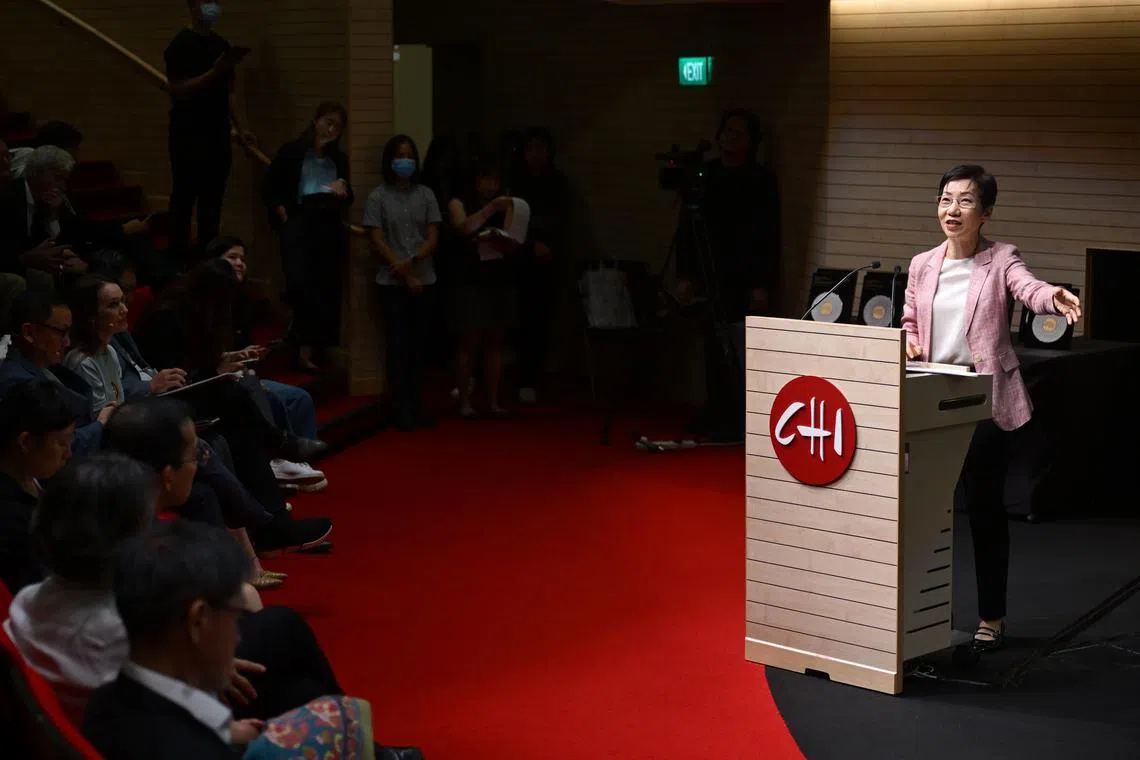New S’pore academy to equip healthcare pros with sustainability skills as sector seeks to go green
Sign up now: Get ST's newsletters delivered to your inbox

Minister for Sustainability and the Environment Grace Fu speaking at the launch of the CHI Sustainability Academy.
ST PHOTO: AZMI ATHNI
SINGAPORE - Even though cataract operations may involve a mere 5cm of the face around the eyes, full-body surgical drapes are put on patients during the procedure as a sterile barrier.
Along with the use of disposable medical instruments, one cataract operation generates around 3kg of waste.
With 2,400 cataract procedures performed at Tan Tock Seng Hospital’s (TTSH) specialist centre in Ang Mo Kio every year, 7,240kg of waste is generated annually.
To reduce the amount of waste, TTSH doctors are making several changes in 2024, including a shift to half-body surgical drapes.
Clinical Associate Professor Wong Hon Tym, senior consultant at TTSH’s ophthalmology department, said: “There are many good eye care systems in less resourced nations that are performing cataract surgery at a very high standard, with possibly five to 10 times less waste than we have.
“Over the years, we’ve built up a strong policy of infection control and quality, but it may have gone a little bit over. So we have to think about cutting back and reducing waste.”
The waste reduction initiative has cut 60kg of waste since its pilot started two weeks ago, and it has a target of 3,127kg per annum.
Prof Wong said the aim is to maintain quality of care while switching to greener options.
Such projects are part of the Singapore healthcare sector’s efforts to decarbonise the energy-intensive industry.
Healthcare systems account for over 4 per cent of global carbon dioxide emissions, in part due to the fact that hospitals have high energy consumption with round-the-clock operations, and hygiene requirements leading to widespread use of disposables.
A new training academy to help healthcare professionals across Singapore pick up sustainability skills as part of efforts to green the sector was officially launched on July 4.
The CHI Sustainability Academy, which is part of the National Healthcare Group cluster, was unveiled by Minister for Sustainability and the Environment Grace Fu at healthcare sustainability conference CHI Innovate 2024, held at the Ng Teng Fong Centre for Healthcare Innovation.
Prof Wong, who is also leading the new academy, pointed out that cutting emissions in the healthcare sector requires a rethink of established practices, like those around infection control and safety practices.
For example, operating theatres are typically kept cold with air-conditioning running all the time, to keep to industry standards of low humidity and temperatures for the use of sensitive equipment.
“The time has come to actively question these standards with data,” said Prof Wong.
“We want to see if we’re able to, in a controlled and safe environment not involving patients, tweak the standard. We would want to see if the operation, function and standard of that equipment is still all right.”
At the new academy, healthcare professionals will be equipped with skills to spearhead sustainable initiatives.
They will be trained in areas like the redesign of processes to be less wasteful and better serve patients, the technicalities of measuring carbon footprint, and the deployment of sustainable materials in the healthcare sector.
For the first year, the academy will select 10 teams in the healthcare sector that will have experts and coaches to guide them on sustainability projects, with an eye towards eventual pilot projects.
“From there, we hope that (the healthcare professionals) don’t just get skills, but also a mindset and a community of practice that will embolden them,” said Prof Wong, who said the academy will also roll out self-learning modules.
A masterclass was organised on July 3 with the International Hospital Federation’s Geneva Sustainability Centre to help healthcare professionals take on new sustainability roles.
One of the 44 participants was TTSH’s deputy director of pharmacy operations, Mr Low Chee Wee.
Mr Low said that during the masterclass, attendees were given a scenario of working in teams to cut a hospital’s emissions by half in seven years.
“I thought the masterclass was very good, because that exercise alone gave me so many ideas on areas to explore. An example is how to properly manage used asthma inhalers in terms of recycling and reusing certain components,” said Mr Low.
In her opening speech at the conference, Ms Fu said that the healthcare sector’s move to cut energy use will help Singapore achieve its net-zero goal by 2050.
The Republic currently relies on natural gas for most of its energy needs but to meet the net-zero goal, more clean energy will need to be incorporated in the energy mix by 2035 and beyond.
Singapore intends to import up to 4 gigawatts of low-carbon electricity by 2035 from its neighbours.
“If all of us collectively, all sectors, are able to reduce energy (consumption) and increase energy efficiency, then we need to import less and we need less to change the mix from fossil to renewable sources,” said Ms Fu.
“If the pie is growing and we have to convert the entire pie from brown energy to green energy... we are going to be reliant on our neighbours for a long, long time.”


